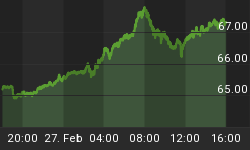What accounts for the 18.4% increase in the S&P 500 stock price index in the 12 months ended June 2007? Was it profit growth? Hardly. The Commerce Department's National Income and Product Accounts (NIPA) measure of corporate profits adjusted for prices (the GDP chain price index) shows the year-over-year change at minus 0.8% as of Q1:2007, the latest data available (see Chart 1). In nominal terms, year-over-year NIPA profit growth was only 2.1% in Q1:2007 vs. 10.1% in Q1:2006 (see Chart 2).
Chart 1
Chart 2
Real GDP growth has slowed significantly. On a year-over-year basis, real GDP was up only 1.8% in Q2:2007 vs. 3.2% in Q2:2006 (see Chart 3).
Chart 3
So, what has been driving U.S. stock prices higher? Massive buybacks of their own stocks by corporations and massive amounts of corporate stocks being purchased by private equity syndicates in taking publicly-traded companies private. And what has been driving this massive "de-equitization"? Cheap credit. Chart 4 shows that non-financial corporate borrowing has picked up in absolute terms and in relative terms - relative to capital spending.
Chart 4
But now, credit to fund de-equitization is getting more expensive. Since June 12, the yield spread between high yield (aka junk) bonds and 10-year U.S. Treasury securities has increased by 150 basis points (see Chart 5). Even with this recent widening, corporate credit-risk spreads still are relatively low (see Chart 6). But should they continue to widen, this de-equitization factor that has been driving up stock prices will wane.
Chart 5
Chart 6
Would a significant slowdown in de-equitization have a negative impact on U.S. aggregate demand? You bet it would. As I argued in my latest The Econtrarian (Wealth Effect or Borrowing/Asset Sales Effect?), households have been net sellers of corporate equities (to corporations and private equity entities), the proceeds of which have been helping to fund household deficits. With the mortgage credit market tightening, a significant slowing in de-equitization would be another nail in the coffin of household spending, which accounts for 75% of real GDP. Perhaps the feeble 0.6% quarter-to-quarter annualized growth in real household expenditures (sum of real personal consumption and residential investment expenditures) in Q2:2007 - the weakest since Q1:1995 - is the new reality (see Chart 7).
Chart 7















